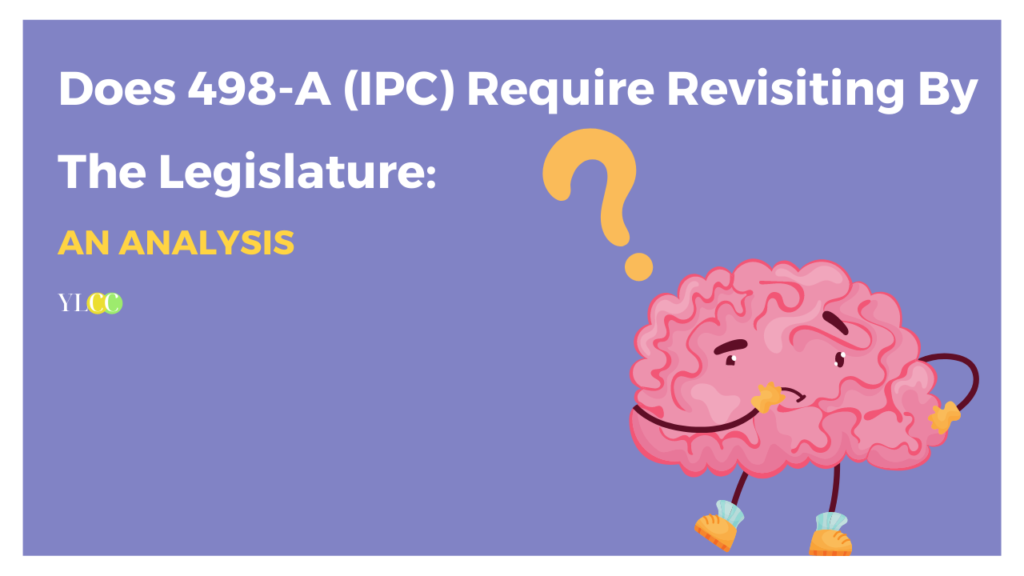
INTRODUCTION
Section 498A[1] deals with cruelty done by husband or his relatives on the woman. The cruelty laws are very strict in their nature as the offence is non cognizable and non bailable. According to the law if anyone is accused of the offence of, they will be arrested without a warrant or directions of the court. The provisions of this section were made so strict in order to reduce the amount of harassment that women face in their husband’s family in general or for dowry. Since there were increasing number of cases of dowry deaths in India, many anti-dowry laws were brought in order to reduces such cases, Section 498a[2] was one of them. There were many anti-dowry laws that were introduced in 1984 through an amendment in the Dowry Prohibition act, 1961.
This article aims at understanding if there is a contemporary need for the legislature to revise this provision. Read on!
FLAWS IN THE CURRENT SECTION 498a
The current Section 498a of the IPC is designed in such a way so that the women affected in by any problem in the homes of their husband can easily file a complaint against the people who are harassing her on any matter. If there were a lot of proof that were required by the police from the aggrieved woman in order for her to be protected by the people who are harassing her. Therefore, the act empowered women to a great extent by providing them immediate protection in case they suffer harassment of any kind from their husband or his family.
But in the process of empowering women the section provided an unchecked amount of power in the hands of women with mala fide intentions. Since the section makes cruelty a cognizable offence, women who want to extort money or want to threaten their husbands, threaten them and their relatives with immediate jail time.
So, there are reforms required in this section as it can be and is being misused by many and no provision should provide someone so much power that they can get anyone arrested on a whim if they wanted to.
POSSIBLE CHANGES TO SECTION 498a
Any reforms in this section must be in a way that they don’t put any obstacles in front of the women who are trying to file the case. First of all, to reduce the power of this section making the offense non cognizable would be a start because the prospect of going to jail is the first thing that is used to threaten the husband or his relatives. The better option to protect the woman if there is a genuine case of the woman should be kept in the woman shelter or with her parents. This will provide protection to her from anyone that is harassing her in any way. The husband and her relatives will be kept at a distance and the proceedings can take place in a manner that is not detrimental to the mental health of both the husband and the wife.
This is also important as our justice system believes that the everyone is innocent till proven guilty, grouping a person who might be guilty of physical or verbal violence with people accused of murder, rape or treason is no way to treat a person who is assumed to be innocent. The conviction rate of the cases filed under Section 498a is 14 to 20 percent whereas in other criminal cases the same is 46 percent[3]. The conviction rate for criminal cases has been rising but in case of Section 498a[4] has been at a steady decline.
Another option is to give power to the husband to file a case against his wife if malice in the wife’s mind can be proven. This will prove highly effective to curb the false cases of cruelty and will. The husband shall also not be liable to pay any maintenance to the wife if he decides to divorce her or annul the marriage once the case is proven to be false, because if the husband is exonerated and wants a divorce the prospect of paying maintenance for the rest of his live until the woman gets remarried will create an obstacle for the husband and will deter the husband from getting the divorce and will cause him to be stuck with a wife who wants to extort him.
There is also a provision that allows for out-of-court settlements in these cases. I believe that such practices should be removed as they increase the chances for extortion and legitimises the extortion that is that is being done.
POSITIVE STEPS TAKEN BY THE COURT
The court has taken notice of this weaponization of the Section 498a and has even various judgements and guidelines that try and regulate the powers of this section, but there have been many instances where these guidelines were not followed by the police and they were given minimal punishment for the same. Some of the landmark cases for this section are:
Manju Ram Kalita V. State of Assam[5] – In this case the court decided that before a case can be filed under this section the seriousness of the matter must be gauged. Since there were cases in which petty quarrels were used as the basis to file the case under this section, the court held that firstly the seriousness of the matter must be analysed and then it must be decided whether the matter is worthy of being pursued under Section 498a.
Arnesh Kumar v State of Bihar [6]– This is a landmark judgement which laid down the guidelines that needed to be followed by the police officers when they are dealing with a case that may involve Section 498a. But there are a lot of instances in which the guidelines are not followed and minimal punishment is give to the guilty Police officer.[7]
CONCLUSION
Section 498a of the Indian Penal Code was made in such a way so that women, who do not have any power, but the same power is being misused by women with mala fide intentions who are using this provision to extort money from their husbands. The treatment of husbands in case a case is filed is very harsh and they are treated like someone who is accused of committing murder or treason, such a harsh conduct with the husband is not fair or just.
Moreover, since this section is being weaponized with the threat of immediate jai time then it is my belief that such a provision in the section should not exist. The statistics of the National Crime Records Bureau clearly shoe that the cases under the section have been increasing and the conviction rate has been steadily declining.
There are many instances where Arnesh Kumar guideline given by the Supreme Court were not being followed by the Police officers but the same was punished with just a day’s imprisonment and during the time of COVID no imprisonment was awarded. So, I think that the legislature should make changes in accordance to the guidelines so that there is no provision that allows immediate imprisonment of the husband or his relatives.
The Supreme Court has taken notice of the weaponization of this act and has tried to make changes to it but they have limited power in this area, in order for there to be real change the legislature needs to make changes in the law so that wrong advantage of the law cannot be taken.
[1] Indian Penal Code, 1860.
[2] Id.
[3] Rakesh Dubbudu, Debate I Low Conviction Rate in Dowry Cases, No Proof of Misuse, https://www.thequint.com/news/india/conviction-rate-lowest-domestic-violence-cruelty-498a-ipc#read-more#read-more.
[4] Indian Penal Code, 1860, supra note 1.
[5] Manju Ram Kalita V. State of Assam (2009) 13 SCC 330 : (2010) 1 SCC (Cri) 1015.
[6] Arnesh Kumar v State of Bihar, (2014) 8 SCC 273.
[7] Nupur Thapliyal, Arrest in Breach Of “Arnesh Kumar” Guidelines: Delhi High Court Sentences Police Officer To One Day Imprisonment, https://www.livelaw.in/news-updates/arrest-in-breach-of-arnesh-kumar-guidelines-delhi-high-court-sentences-police-officer-to-one-day-imprisonment-188694.
YLCC would like to thank Varchasva Agrawal for her valuable insight into this article.







